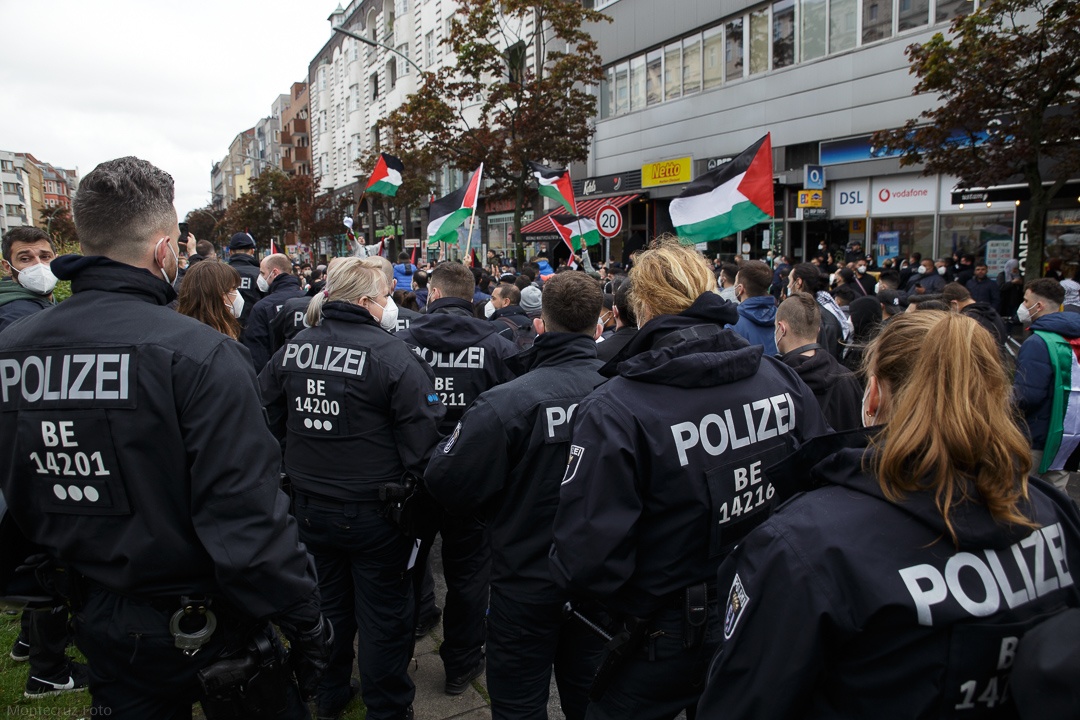Is the Israel-Hamas War Spilling Over Into Europe?
Unpacking the rise in antisemitic and anti-Muslim incidents beyond the Middle East.

With approximately 1,200 Israelis killed after the Oct. 7 Hamas attack, and an estimated 15,000 Palestinians killed as a result of the intense Israeli military response in the Gaza Strip, it’s been a devastating two months in Israel and Palestine. But the violence has not been limited to the Middle East.
The Israel-Hamas conflict is spilling over into Europe, as threats and physical attacks targeting minority groups have escalated across the continent, and a terrorist attack in Paris was allegedly triggered in part by the Gaza situation.
In France, the interior minister said that more than 1,500 antisemitic acts were recorded in the month following Hamas’s attack—three times more than in all of 2022. In the U.K., Jews have experienced “the worst wave of hate incidents in modern times,” according to the Community Security Trust, which recorded over 1,000 incidents in a month. The Dutch National Coordinator for Combating Anti-Semitism has received more reports of incidents (an 818 percent increase in a month). These incidents range from micro-aggressions, such as insults, to death threats, attacks on buildings and other infrastructure, or physical attacks, including the stabbing of a Jewish woman in Lyon. In Germany, two individuals allegedly threw petrol bombs on a synagogue on Oct. 18. In Austria, a fired damaged part of the Vienna Jewish cemetery and someone vandalized the cemetery with Swastika symbols on Nov. 1. Attacks on synagogues and Jewish schools occurred in several other countries in Europe.
Anti-Muslim incidents have increased significantly as well, although there is less systematic monitoring of such incidents, according to Human Rights Watch. In the U.K., the British charity Tell MAMA recorded a sevenfold increase in Islamophobic hate crimes in the month after Hamas’s attack. In Germany, CLAIM, the umbrella organization for civil society actors combating Islamophobia, has recorded three anti-Muslim incidents per day over the past few weeks, including personal assaults and attacks on mosques. In France, unidentified individuals have tagged several mosques with racist slurs and death threats. Peaceful pro-Palestine events were targeted as well, raising concerns about escalation of violence between different groups. In France, far-right extremists violently attacked a pro-Palestine conference in Lyon.
Online hatred against Jews and Muslims has also surged. Antisemitic content soared by almost 1,000 percent on X, the platform formerly known as Twitter, in a month, and a significant increase in antisemitism and Islamophobia on YouTube was reported, while anti-Muslim content increased by 300 percent in the week after Hamas’s terrorist attack. Over the past month, the hashtags #HitlerwasRight, #DeathtoJews, #KillMuslims, and #LevelGaza have received tens of thousands of engagements on X.
This increase of hate speech and racially motivated crimes creates a feeling of insecurity among both Jewish and Muslim communities. They have also led to a number of arrests—almost 600 in France in the month that followed Hamas’s attack. In the U.K. there have been at least 253 arrests during protests and public gatherings related to the Israel-Hamas conflict, around half of those related to hate crimes and eight to counter terror investigations. Several European countries have raised their domestic threat levels as a result of the Israel-Hamas conflict, including Austria, Spain, Portugal, and Slovenia. France and Belgium had already raised their terror threat levels after recent terrorist attacks in Arras and Brussels, and several European governments have also reinstated temporary border controls in the Schengen area.
Unpacking the “Spillover Effect”
As the uptick in incidents indicates, the Israel-Hamas conflict is having security repercussions well beyond the Middle East, notably in Europe. These repercussions are numerous and diverse, each carrying specific security risks related to violent extremism and terrorism.
Violent Extremism
The rise of hate speech against Jews and Muslims in Europe, as well as images of massacred civilians on either side, could be conducive to the radicalization of certain individuals and possibly result in violent acts. Some incidents have already occurred, as mentioned above, and more could still occur. These acts do not necessarily qualify as terrorism, because they are less motivated by an ideology than by hatred and a sense of retaliation or self-preservation. In such cases, perpetrators might not belong or adhere to a terrorist group, although they would likely be avid consumers of online extremist propaganda. Recognizing this particular risk, a number of countries, such as Germany, Belgium, and others, have taken extra measures to secure Jewish sites.
Terrorism
The threat from jihadi terrorism could increase as a result of the conflict. On Dec. 2, a man killed one and injured two in a knife attack near the Eiffel Tower in Paris. The attack seemed in part motivated by the situation in Gaza, although more factors were at play given the perpetrator’s unstable profile and previous engagement in jihadism. After arrest, he justified his attack by the death of Muslims “in Afghanistan and Palestine.” The German domestic intelligence agency (BfV) recently assessed that the terrorist threat is “higher than it has been for a long time,” notably due to the risk of Islamist attacks inspired by the conflict between Israel and Hamas. In the U.K., MI5 has expressed concerns that the conflict could fuel the terrorist threat domestically, while intelligence services in France and Belgium have been more cautious—acknowledging a risk but recognizing (prior to the Paris attack) that there are no concrete indications so far of terrorist intentions related to the ongoing conflict. The perpetrators of two recent terrorist attacks in France (Oct. 13) and Belgium (Oct. 16) seemed triggered only marginally by the situation in Gaza, as their radicalization and violent plotting predated the Hamas terrorist attack.
Global jihadi groups such as the Islamic State and al-Qaeda are very different from Hamas, as evidenced by their occasional rivalries, but they are still likely to use the conflict to further seek to recruit and mobilize. The Islamic State and al-Qaeda have both already taken advantage of the moment to call for individuals to act against Jewish targets in Europe and North America. The terrorist threat could also increase from the far right, as accelerationist groups and white supremacists amplify both antisemitic and Islamophobic content to further their agenda, which is to trigger a civil war.
Foreign Influence
The security situation in Europe might deteriorate further as a result of malign operations from third-party countries. Indeed, state actors may take advantage of the situation to further undermine social cohesion and exacerbate political polarization in Europe. Russia’s attempts to feed political extremes in order to weaken geopolitical rivals are well documented. Unsurprisingly, Russia is already suspected by French investigators of being behind the painting of the Star of David across buildings in Paris, a move likely to exacerbate antisemitism and fuel far-right extremism. Russia is also suspected of attempts to exacerbate anti-migrant narratives in Finland, by facilitating the transportation of Middle Eastern migrants to the Finnish border, increasing populist fears that Muslims might overrun the country.
Iran has allegedly involved itself in several violent plots across Europe in the past year and could further reinforce these activities, including attacks on Jewish targets. Iran supports several armed groups in the region, including the Houthis in Yemen and Hezbollah in Lebanon, and while neither group is currently targeting Europe, their involvement in the region could deepen the conflict. This includes a recent ballistic missile attack by the Houthis at three commercial vessels and a U.S. warship which are believed to have been “fully enabled” by Iran.
Meanwhile, Israel’s Prime Minister Benjamin Netanyahu has instructed the security service Mossad to act against Hamas leaders “wherever they are.” This opens the door for possible targeted Israeli operations outside the Middle East.
What Next?
The Israel-Hamas conflict could affect Europe’s security in many different ways in the short-to-medium term. Not every threat is equally likely, nor would every threat have an equal impact within Europe. However, taken together, the simultaneous and ongoing presence of these threats justifies higher security threat levels for now. A true 360-degree approach is required from the security services to detect and counter the various threats detailed above, encompassing violent extremism, terrorism, and foreign influence.
More broadly, the overall environment of social polarization, fueled by emotions and extremist narratives, must be effectively managed. European governments should take a clear stance against all forms of hate speech and related violence and apply this equally to all citizens. Local government and police can communicate to the public how they are responding to such incidents and where to report them, and they can reach out to affected communities to help build public confidence. Increasing the monitoring of persons of concern and the identification of potential plots will also be required by police and intelligence services. Social media companies must further intensify their efforts to detect and remove harmful content online.
At the same time, governments should be explicit about the ways in which citizens can legally express their opinions and protect them, and what would be considered illegal under current criminal codes. Restricting liberties or criminalizing peaceful behaviors, particularly if appearing to be done with an ideological bias, will only further exacerbate polarization and radicalization. More space should also be made in the political and public debates for nuance and moderation, in order to resist simplifications and toxic binary views that underpin extremism. Nongovernmental actors, including multi-faith leaders, influencers, and nongovernmental organizations, can also come together and lead dialogue and peace-building efforts between affected communities.
The rise of tensions and incidents resulting from the Israel-Hamas conflict was inevitable. But the manner in which European leaders manage those incidents is not.




.jpg?sfvrsn=118b03e5_5)

